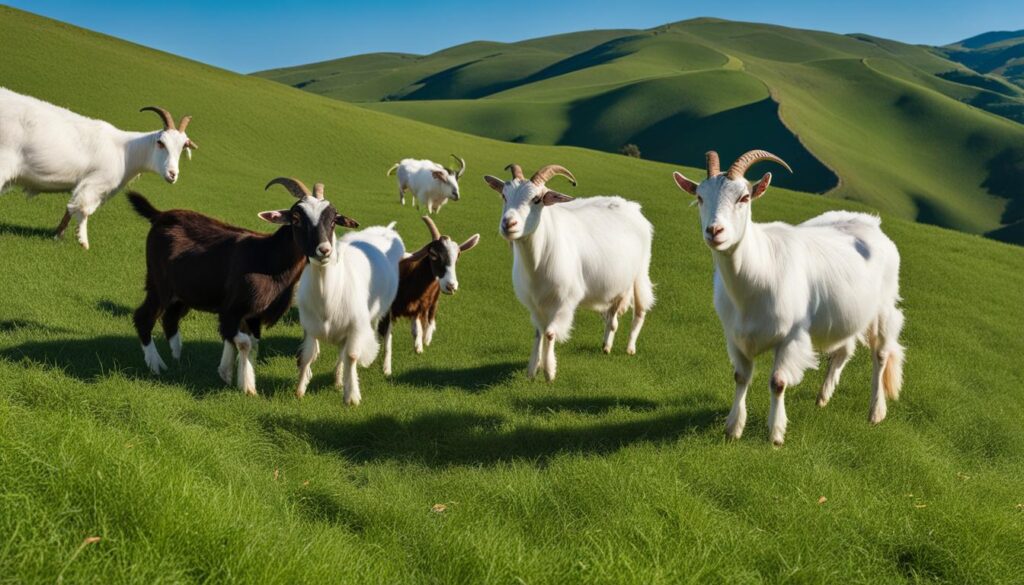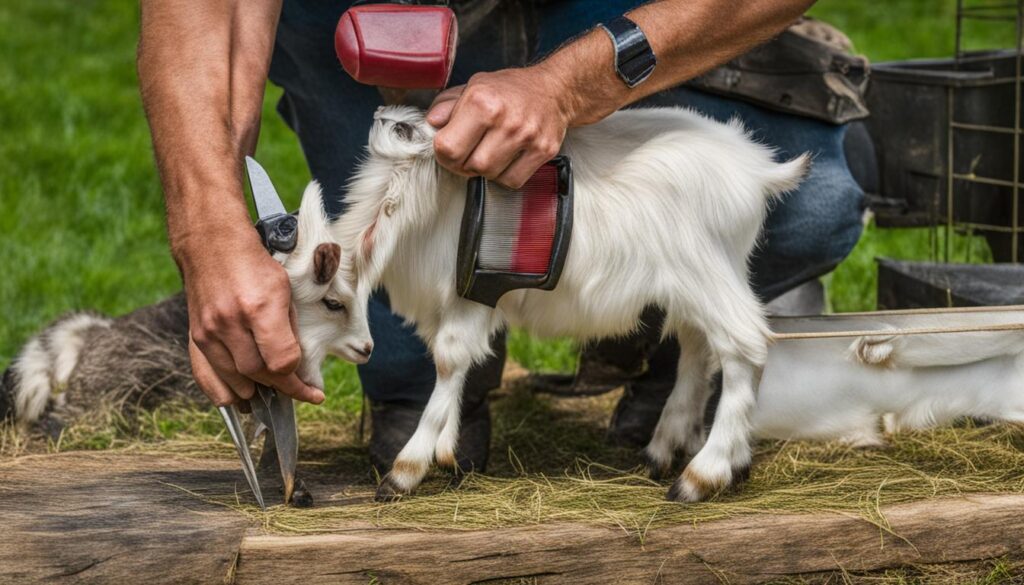As someone with a passion for raising productive livestock on my hobby farm, the resilience and productivity of the kiko boer goat cross have earned my admiration. These hybrid goats, a robust blend of the New Zealand Kiko and the South African Boer, offer a hardy alternative to traditional livestock options. Through my personal journey, I have discovered how these resilient goat breeds thrive, even in the smaller confines of a backyard farm, and I’m excited to share my insights with you.
Their exceptional growth rates and adaptability really stand out, showcasing their suitability for a hobby farm like mine. My experience with kiko boer goat crosses has been nothing short of remarkable; they require minimal special care, while consistently showcasing their vigor and robust nature. Whether you’re an established hobby farmer or just starting, these hybrids can be an outstanding addition to your farmstead.
Key Takeaways
- Kiko boer goat crosses blend the best traits for a resilient and productive hybrid suited for hobby farms.
- These hybrids offer exceptional growth rates, making them valuable for small-scale agricultural efforts.
- Adaptability and minimal care requirements are hallmarks of the kiko boer goat cross.
- The crossbreed is an excellent choice for varied climatic conditions and diverse foraging opportunities.
- As a testament to their hardiness, these goats have made a significant and positive impact on my personal farming experience.
Introducing the Kiko Boer Goat Cross: A Hardy Hybrid for Hobby Farmers
Embarking on the journey of hobby farming with goats introduces a multitude of benefits, and when it comes to selecting a sturdy and adaptable breed, the Kiko Boer goat cross stands out. This fine specimen marries the exceptional traits of its parents: the tenacious New Zealand Kiko and the brawny South African Boer goat. My firsthand experience with these goats in my own hobby farming endeavor has revealed their commendable nature as hardy goat hybrids and sustainable livestock assets.
The resilient Kiko Boer cross is a testament to the concept that two robust breeds can create an even stronger descendant. The introduction of the Kiko Boer cross has marked a new chapter in sustainable farming practices, offering a set of characteristics finely tuned to the challenges and rewards of smaller-scale agriculture.
- Foraging Prowess: Inherited from the Kiko lineage, these goats possess a natural knack for efficiently browsing and grazing, reducing the need for supplemental feed.
- Rapid Growth: Emulating their Boer ancestors, they showcase swift weight gain, a desirable trait for both meat producers and hobbyists seeking vigorous livestock.
- Disease Resilience: The hybrid vigor inherent in these crosses renders them less prone to common ailments, ensuring a robust flock with less intervention.
For those new to the rewarding world of goat keeping, a kiko boer cross introduction may very well be the stepping stone into a thriving, self-sufficient agricultural lifestyle. By cherishing these hardy goat hybrids, you’re not only nurturing a flock of resilient animals; you’re also reinforcing the principles of sustainable livestock management.
Having nurtured the Kiko Boer goat cross, I can affirm their suitability for hobby farms. They’ve demonstrated a strong constitution, vigorous growth, and a pleasant demeanor, making them delightful to raise and a boon to my sustainable homestead.
Understanding the Benefits of Kiko and Boer Goat Crossbreeding
As a passionate hobby farmer, I’ve experienced the significant advantages that come from crossbreeding Kiko and Boer goats. The synergy of Kiko resilience and Boer goat growth introduces a breed well-suited for diverse climates and farm sizes. Their ability to thrive in mixed environments is a crucial benefit for those of us working with limited acreage.

The Best of Both Worlds: Kiko Resilience Meets Boer Growth Rates
When I ventured into crossbreeding, my goal was to have a herd that could withstand the rigors of my region’s weather while still producing significant meat yields. Through crossbreeding Kikos with Boers, I have created a stock that combines Kiko resilience—known for their toughness against the elements—with the rapid, robust Boer goat growth. It’s this blend that has allowed my herd to not only survive but thrive in conditions where other breeds may falter.
Hybrid Vigor: Improving Disease Resistance in Your Herd
One of the most noteworthy impacts of crossbreeding in livestock is hybrid vigor. This genetic phenomenon boosts the overall health and vitality of the offspring, leading to better resistance to common diseases. It’s deeply satisfying to see my goats require fewer interventions for health issues, underlining the essential role of hybrid vigor in disease prevention within my herd.
Maximizing Your Pasture: Efficient Foragers for Smaller Acreages
The Kiko Boer goat crosses are true efficient foragers. Watching them graze, I’ve observed how they optimize my pasture by naturally selecting a variety of forage, reducing the need for costly feed. Such efficient utilization of space is particularly advantageous for a hobby farm like mine, where maximizing the utility of every square foot of land is essential.
Raising Kiko Boer Crosses: My Personal Insights from the Field
As someone deeply invested in the world of farming, raising kiko boer goats has been both a journey and a joy. The unique challenges and rewards of hybrid goat care have equipped me with valuable personal farming insights that I am eager to share with fellow hobbyists. In this journey, one thing has stood out consistently: understanding each animal’s needs leads to a thriving herd.

Practical goat-rearing tips often begin with the basics: housing and space. A sturdy shelter that provides protection from the elements is crucial, but so is ensuring that these active animals have ample room to roam and exercise. I’ve come to recognize that their well-being hinges on a balance of these factors. Moreover, routine health check-ups are imperative. While Kiko Boer crosses are notably robust, they are not immune to illness. Regular monitoring for common health issues keeps potential problems at bay.
- Develop a routine for health assessments and vaccinations.
- Provide shelters that guard against weather extremes.
- Ensure open spaces for grazing and exercise to accommodate their active nature.
Discovering the intricacies of hybrid goat care has taught me the importance of being both hands-off and observant. The Kiko Boer cross thrives on a mix of independence and mindful oversight.
I have seen fantastic results by tailoring my approach to each individual goat’s personality and requirements. It’s this dedicated attention to detail that transforms regular goat care into a specialized and fulfilling craft. So, for anyone diving into the world of Kiko Boer goats, remember that your patience and attentiveness will be rewarded with a hardy and productive livestock member.
Feeding and Nutrition Tips for Kiko Boer Goat Cross Hybrids
Ensuring my Kiko Boer goat cross hybrids thrive means paying close attention to their diet and nutrition. Striving to provide a well-rounded meal plan, I’ve developed a series of effective goat feeding tips, prioritizing balanced goat diets and employing goat supplementation strategies that contribute to vigorous health and growth.
Balanced Diets for Optimal Health and Growth
To meet the specific nutritional needs of my hybrids, I trust in a regimen that mirrors the robustness of their genetics. Balanced nutrition for hybrids is crucial, and I focus on crafting diets that deliver the right mix of energy, protein, vitamins, and minerals.
My golden rule: A sufficiently rich diet ensures not only good physical condition but also supports their immune response and reproductive success.
Supplementation Strategies: What Works for My Hybrid Goats
My pastoral management routine includes using supplementation to enhance the natural diet of my goats. I’ve fine-tuned my goat supplementation strategies over time, with a particular focus on key stages such as kiddings and the rut season.
- Mineral Blocks
- Protein Pellets during harsh weather
- Specialized feeds during pregnancy and lactation
The Importance of Clean Water and Forage Quality
Central to any healthful goat diet is unimpeded access to clean water and a steady supply of high-quality forage. For optimal forage quality, I employ seasonally adjusted pastoral management techniques to ensure my fields are in prime condition, providing my hybrids with the best possible nutrition.
| Season | Forage Type | Supplementation |
|---|---|---|
| Spring | Lush Pasture | Mineral Rich Licks |
| Summer | Dried Hay | Protein Blocks |
| Fall | Hay and Chaff | Vitamin Supplements |
| Winter | Silage | Energy Rich Pellets |
Through a blend of experience and careful observation, I’ve honed my approach to feeding and nurturing Kiko Boer goat cross hybrids. By staying attuned to their needs with strategic feeding practices, I’m proud to foster a flock that is as hearty and productive as the land they graze upon.
Health Management and Veterinary Care for a Robust Hybrid Flock
Maintaining the well-being of your kiko boer goat cross requires consistent and dedicated goat health management practices. In my journey, routine procedures have become the framework for cultivating a flock that is not just surviving but thriving. Key among these are regular vaccinations which ward off common diseases, while periodic deworming combats internal parasites that could otherwise weaken your livestock. Hoof care, which I perform diligently, is also crucial to prevent lameness and ensure the animals are comfortable and mobile.
Veterinary care for hybrids is an investment in the longevity and vitality of your herd. My collaboration with a trustworthy veterinarian has granted me peace of mind, particularly with these robust kiko boer goat cross animals. The vet’s expertise has guided me through creating a health regimen tailored to the specific needs of my hybrid goats. This partnership is not only essential during unforeseen health emergencies but also for proactive consultations that direct my daily care and preventive measures.
Farm animal wellness goes beyond treatment; it is about observation and intervention. By observing my goats daily, I’ve honed my ability to pick up on any subtle changes in behavior or condition that could indicate health issues. This attentiveness facilitates early detection, allowing for a timely and effective response to protect the health of the flock. The result? A collection of vigorous and productive goats that exemplify the hardiness of the kiko boer goat cross. It’s a rewarding experience that underscores the importance of conscientious care in raising exceptional hybrid livestock.
